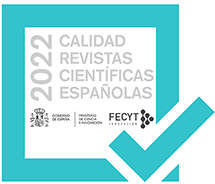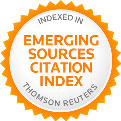Orientaciones de meta como mediadoras en la relación entre perfeccionismo y ansiedad precompetitiva. [Goal orientations as mediators in the relationship between perfectionism and precompetitive anxiety].
Resumen
El objetivo de este estudio fue analizar el efecto del perfeccionismo estado y las orientaciones de meta, sobre la ansiedad precompetitiva, a través de dos modelos que prueban las relaciones secuenciales. Un primer modelo analizó el efecto del perfeccionismo global en competición, sobre las orientaciones de meta, y consecuencias de ansiedad precompetitiva. Posteriormente, el perfeccionismo se separó en dos dimensiones, positiva y negativa, a partir de las facetas de esfuerzo por la perfección, y reacciones negativas ante la imperfección, respectivamente. Tal modelo probó la secuencia: dos facetas del perfeccionismo multidimensional en competición, orientaciones de meta, y consecuencias de ansiedad precompetitiva. Adicionalmente, en este segundo modelo se analizó el papel mediador de las orientaciones de meta. Participaron 171 deportistas de alto rendimiento, de ambos sexos, con una edad de 23.5 años (DT= 6.1), quienes respondieron a un conjunto de cuestionarios para medir las variables de estudio previo a una competición. Los modelos de ecuaciones estructurales mostraron que el perfeccionismo global predice la orientación al ego, y ésta la ansiedad cognitiva. No obstante, cuando dos dimensiones del perfeccionismo son diferenciadas, ambas facetas del perfeccionismo predicen positivamente la orientación al ego y los síntomas de ansiedad; contrariamente el esfuerzo por la perfección también predice positivamente la orientación a la tarea, y ésta negativamente ambas ansiedades. En conclusión, se refuerza que el perfeccionismo estado puede ser adaptativo, ya que el esfuerzo por la perfección en competición reduce los síntomas de ansiedad precompetitiva a través de la orientación a la tarea; por lo que las orientaciones de meta explican teóricamente la relación entre el esfuerzo por la perfección y la ansiedad precompetitiva.
Abstract
The aim of this study was to analyze a predictive model of state perfectionism on goal orientations, and precompetitive anxiety and self-confidence, through two models that analyze sequential relationships. A first model analyzed the effect of global perfectionism in competition, on goal orientations, and consequences of precompetitive anxiety and self-confidence. Subsequently, perfectionism was separated into two dimensions, positive and negative, from the facets of striving for perfection, and negative reactions to imperfection, respectively. Such a model proved the sequence: two facets of multidimensional perfectionism in competition, goal orientations, and consequences of precompetitive anxiety and self-confidence. Additionally, the mediating role of goal orientations within the second model was analyzed. 171 high-performance athletes of both sexes, with an age of 23.5 years participated in the study, who answered a set of questionnaires to measure the study variables before the competition. The results of structural equation models showed that global perfectionism predicts ego orientation and cognitive anxiety. However, the two facets of perfectionism positively predict ego orientation and anxiety symptoms. Contrary to the striving for perfection also positively predicts the orientation in the task, and this negatively both anxieties. In conclusion, it is reinforced that state perfectionism can be an adaptive trait, since the striving for perfection, if accompanied by a predominance of task orientation. So the goal orientations theoretically explain the relationship between the striving for perfection and precompetitive anxiety.
https://doi.org/10.5232/ricyde2018.05205
Referencias/references
Ames, C. (1992). Classrooms: goals, structures and student motivation. Journal of Educational Psychology, 84(3), 261-271. Ames, C. (1992). Classrooms: goals, structures and student motivation. Journal of Educational Psychology, 84(3), 261-271.
https://doi.org/10.1037/0022-0663.84.3.261
Appleton, P. R.; Hall, H. K., & Hill, A. P. (2009). Relations between multidimensional perfectionism and burnout in junior-elite male athletes. Psychology of Sport and Exercise, 10(4), 457-465.
https://doi.org/10.1016/j.psychsport.2008.12.006
Breeding, T. W., & Anshel, M. H. (2015). Relationship between sport perfectionism and perceived competence as a function of skill level and sport type. Journal of Sport Behavior, 38(4), 376.
Browne, M. W., & Cudeck, R. (1993). Alternative ways of assessing model fit. En K. A. Bollen y J. S. Long (Eds.), Testing Structural Equation Models (pp. 136-162). Newbury Park, CA.: SAGE.
Burton, D. (1988). Do anxious swimmers swim slower? Reexamining the elusive anxiety-performance relationships. Journal of Sports and Exercise Psychology, 10(1), 45-61.
https://doi.org/10.1123/jsep.10.1.45
Chang, E. C. (2003). On the perfectibility of the individual: Going beyond the dialectic of good versus evil. En E. C. Chang y L. J. Sanna (Eds.), Virtue, vice, and personality: The complexity of behavior (pp. 125-144). Washington, DC: American Psychological Association.
https://doi.org/10.1037/10614-008
Cox, R. H. (2009). Psicología del deporte: Conceptos y sus aplicaciones. Madrid: Médica Panamericana.
Craft, L. L.; Magyar, T. M.; Becker, B. J., & Feltz, D. L. (2003). The relationship between the Competitive State Anxiety Inventory-2 and sport performance: A Meta-Analysis. Journal of Sport and Excercise Psychology, 25(1), 44-65.
https://doi.org/10.1123/jsep.25.1.44
Duda, J. L. (2005). The relevance of competence and achievement goals. En A. J. Elliot y C. S. Dweck (Eds.), Handbook of competence and motivation (pp. 318-335). New York: Guiford.
Duda, J. L., & Hall, H. (2001). Achievement goal theory in sport: Recent extensions and future directions. En R. N. Singer, H. A. Hausenblas y C. M. Janelle (Eds.), Handbook of sport psychology (pp. 417 – 443). New York: Wiley.
Dunn, J. G. H.; Causgrove Dunn, J., & Syrotuik, D. G. (2002). Relationship between multidimensional perfectionism and goal orientations in sport. Journal of Sport and Exercise Psychology, 24(4), 376-395.
https://doi.org/10.1123/jsep.24.4.376
Egan, S. J.; Wade, T. D., & Shafran, R. (2011). Perfectionism as a transdiagnostic process: A clinical review. Clinical Psychology Review, 31(2), 203-212.
https://doi.org/10.1016/j.cpr.2010.04.009
Flett, G. L., & Hewitt, P. L. (2002). Perfectionism and maladjustment: An overview of theoretical, definitional, and treatment issues. En G. L. Flett y P. L. Hewitt (Eds.), Perfectionism: Theory, research, and treatment, (pp. 5-31). Washington, DC: American Psychological Association.
https://doi.org/10.1037/10458-001
Flett, G. L., & Hewitt, P. L. (2005). The perils of perfectionism in sports and exercise. Current Directions in Psychological Science, 14(1), 14-18.
https://doi.org/10.1111/j.0963-7214.2005.00326.x
Flett, G. L.; Hewitt, P. L.; Blankstein, K. R., & Dynin, C. B. (1994). Dimensions of perfectionism and Type A behaviour. Personality and Individual Differences, 16(3), 477-485.
https://doi.org/10.1016/0191-8869(94)90073-6
Frost, R. O., & Henderson, K. J. (1991). Perfectionism and reactions to athletic competition. Journal of Sport and Exercise Psychology, 13(4), 323-335.
https://doi.org/10.1123/jsep.13.4.323
Frost, R. O.; Heimberg, R. G.; Holt, C. S.; Mattia, J. I., & Neubauer, A. L. (1993).
A comparison of two measures of perfectionism. Personality and Individual Differences, 14(1), 119-126.
https://doi.org/10.1016/0191-8869(93)90181-2
Frost, R. O.; Marten, P.; Lahart, C., & Rosenblate, R. (1990). The dimensions of perfectionism. Cognitive Therapy and Research, 14(5), 449-468.
https://doi.org/10.1007/BF01172967
Gould, D.; Dieffenbach, K., & Moffett, A. (2002). Psychological characteristics and their development in Olympic champions. Journal of Applied Sport Psychology, 14(3), 172-204.
https://doi.org/10.1080/10413200290103482
Gucciardi, D. F.; Mahoney, J.; Jalleh, J.; Donovan, R. J., & Parkes, J. (2012). Perfectionistic profiles among elite athletes and differences in their motivational orientations. Journal of Sport and Exercise Psychology, 34(2), 149-183.
https://doi.org/10.1123/jsep.34.2.159
Hall, H. K.; Kerr, A. W., & Matthews, J. (1998). Precompetitive anxiety in sport: The contribution of achievement goals and perfectionism. Journal of Sport and Exercise Psychology, 20(2), 194-217.
https://doi.org/10.1123/jsep.20.2.194
Hall, H. K.; Kerr, A. W., Kozub, S. A., & Finnie, S. B. (2007). Motivational antecedents of obligatory exercise: The influence of achievement goals and multidimensional perfectionism. Psychology of Sport and Exercise, 8(3), 297-316.
https://doi.org/10.1016/j.psychsport.2006.04.007
Hamidi, S., & Besharat, M. A. (2010). Perfectionism and competitive anxiety in athletes. Procedia-Social and Behavioral Sciences, 5, 813-817.
https://doi.org/10.1016/j.sbspro.2010.07.190
Hill, R. W.; Huelsman, T. J.; Furr, R. M.; Kibler, J.; Vicente, B. B., & Kennedy, C. (2004). A new measure of perfectionism: The Perfectionism Inventory. Journal of Personality Assessment, 82(1), 80–91.
https://doi.org/10.1207/s15327752jpa8201_13
Hu, L. T., & Bentler, P. M. (1999). Cutoff criteria for fit indexes in covariance structure analysis: Conventional criteria versus new alternatives. Structural Equation Modeling: A Multidisciplinary Journal, 6(1), 1-55.
https://doi.org/10.1080/10705519909540118
Jöreskog, K. G., & Sörbom, D. (2006). Lisrel 8.80 [Computer software]. Chicago: Scientific Software International.
Lemyre, P.-N., Hall, H. K., & Roberts, G. C. (2008). A social cognitive approach to burnout in athletes. Scandinavian Journal of Medicine and Science in Sports, 18(2), 221-234.
https://doi.org/10.1111/j.1600-0838.2007.00671.x
López, J., y Pineda, A. (2015). Orientaciones de meta, intensidad y dirección de ansiedad precompetitiva en deportistas universitarios. Ciencia UANL, 18(74), 44-50.
López-Walle, J.; Balaguer, I., Meliá, J. L.; Castillo, I., y Tristán, J. (2011). Adaptación a la población mexicana del Cuestionario de Orientación al Ego y a la Tarea en el Deporte (TEOSQ). Revista de Psicología del Deporte, 20(2), 523-536.
MacKinnon, D. P.; Lockwood, C. M.; Hoffman, J. M.; West, S. G., & Sheets, V. (2002). A comparison of methods to test mediation and other intervening variable effects. Psychological Methods, 7(1), 83-104.
https://doi.org/10.1037/1082-989X.7.1.83
Martens, R.; Vealey, R. S., & Burton, D. (1990). Competitive anxiety in sport. Champaign, IL: Human Kinetics Publishers.
Muñoz, A. J.; González, J., y Olmedilla, A. (2016). Perfeccionismo percibido y expresión de ira en deportistas varones adolescentes: Influencia sobre la autoestima. Revista Argentina de Ciencias del Comportamiento, 8(3), 30-39.
Munroe-Chandler, K. J.; Hall, C. R., & Weinberg, R. S. (2004). A qualitative analysis of the types of goals athletes set in training and competition. Journal of Sport Behavior, 27(1), 58-74.
Nicholls, J. G. (1989). The competitive ethos and democratic education. Cambridge, ASS: Harvard University.
Ommundsen, Y.; Roberts, G. C.; Lemyre, P.-N., & Miller, B. W. (2005). Peer relationships in adolescent competitive soccer: Associations to perceived motivational climate, achievement goals and perfectionism. Journal of Sports Sciences, 23(9), 977-989.
https://doi.org/10.1080/02640410500127975
Pineda-Espejel, A.; Alarcón, E. I.; López-Walle, J., y Tomás-Marco, I. (2017). Adaptación al español de la versión corta del Inventario de Perfeccionismo Multidimensional en el Deporte en competición. Revista Iberoamericana de Diagnóstico y Evaluación – e Avaliação Psicológica, 43(1), 45-57.
https://doi.org/10.21865/RIDEP43_45
Pineda-Espejel, H. A.; López-Walle, J., y Tomás, I. (2014). Validación de la versión mexicana del CSAI-2R en sus escalas de intensidad y dirección. Revista Mexicana de Psicología, 31(2), 198-212.
Roberts, G. (2001). Advances in motivation in sport and exercise. Champaign IL: Human Kinetics.
Ruiz-Juan, F., y Zarauz, A. (2013). Ansiedad, satisfacción, percepción y creencias sobre las causas del éxito en atletas veteranos españoles. Revista de Ansiedad y Estrés, 19(1), 83-93.
Saboonchi, F., & Lundh, L. G. (1999). State perfectionism and its relation to trait perfectionism, type of situation, priming, and being observed. Scandinavian Journal of Behaviour Therapy, 28(4), 154-166.
https://doi.org/10.1080/028457199439900
Slaney, R. B.; Rice, K. G., Mobley, M.; Trippi, J., & Ashby, J. S. (2001). The Revised Almost Perfect Scale. Measurement and Evaluation in Counseling and Development, 34(3), 130-145.
Smith, R. E.; Smoll, F. L., & Schutz, R. W. (1990). Measurement and correlates of sport specific cognitive and somatic trait anxiety: The Sport Anxiety Scale. Anxiety Research, 2(4), 263-280.
https://doi.org/10.1080/08917779008248733
Stoeber, J. (2011). The dual nature of perfectionism in sports: Relationships with emotion, motivation, and performance. International Review of Sport and Exercise Psychology, 4(2), 128-145.
https://doi.org/10.1080/1750984X.2011.604789
Stoeber, J., & Otto, K. (2006). Positive conceptions of perfectionism: Approaches, evidence, challenges. Personality and Social Psychology Review, 10(4), 295-319.
https://doi.org/10.1207/s15327957pspr1004_2
Stoeber, J.; Otto, K.; Pescheck, E.; Becker, C., & Stoll, O. (2007). Perfectionism and competitive anxiety in athletes: Differentiating striving for perfection and negative reactions to imperfection. Personality and Individual Differences, 42(6), 959-969.
https://doi.org/10.1016/j.paid.2006.09.006
Stoll, O.; Lau, A., & Stoeber, J. (2008). Perfectionism and performance in a new basketball training task: Does striving for perfection enhance or undermine performance? Psychology of sport and Exercise, 9(5), 620-629.
https://doi.org/10.1016/j.psychsport.2007.10.001
Weinberg, R. S., & Gould, D. (2010). Fundamentos de psicología del deporte y del ejercicio físico. Madrid: Médica Panamericana.
Palabras clave/key words
Texto completo/Full Text:
PDF------------------------ 0 -------------------------
RICYDE. Revista Internacional de Ciencias del Deporte
![]()

Publisher: Ramón Cantó Alcaraz
ISSN:1885-3137 - Periodicidad Trimestral / Quarterly

